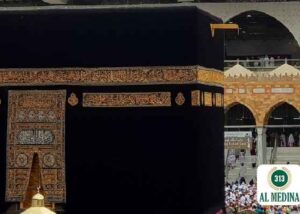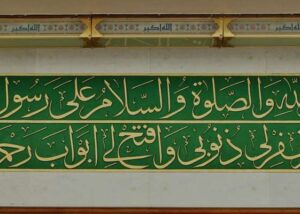Is entering ihram for Umrah from Masjid al-Aqsa better? Is there extra reward?
Quran
Hadith
Islamic Text
بِسْمِ اللَّهِ الرَّحْمَنِ الرَّحِيمِ
In the Name of Allah Most Merciful Most Kind
Short Answer
There is extra virtue in entering Ihram for Umrah from Masjid al-Aqsa. In a weak Hadith, it is mentioned that making Umrah from Masjid al-Aqsa leads to the forgiveness of previous sins.
Hadith
يَحْيَى بْنِ أَبِي سُفْيَانَ، عَنْ أُمِّهِ أُمِّ حَكِيمٍ بِنْتِ أُمَيَّةَ، عَنْ أُمِّ سَلَمَةَ، زَوْجِ النَّبِيِّ صَلَّى اللهُ عَلَيْهِ وَسَلَّمَ قَالَتْ: قَالَ رَسُولُ اللَّهِ صَلَّى اللهُ عَلَيْهِ وَسَلَّمَ: مَنْ أَهَلَّ بِعُمْرَةٍ مِنْ بَيْتِ الْمَقْدِسِ، كَانَتْ لَهُ كَفَّارَةً، لِمَا قَبْلَهَا مِنَ الذُّنُوبِ. قَالَتْ: فَخَرَجَتْ أُمِّي مِنْ بَيْتِ الْمَقْدِسِ بِعُمْرَةٍ
Yahya bin Abi Sufyan narrated from his mother Umm Hakim bint Umayyah. She narrated from Umm Salamah, the wife of the Prophet ﷺ, who said: The Messenger of Allah ﷺ said, ‘Whoever begins Umrah from Baitul-Maqdis, will have an expiation for all his previous sins.’ (Sunan Ibn Maja, 3002).
The Hadith narration above is also found in; Abu Dawood (1741), Ahmad (26558), Musanaf Abd al-Razaq (9165), Musanaf Ibn Abi Shaybah (12692), Hakim (5932), Ibn Maja (3001), al-Darqutni (2712 and 2713), Ibn Hiban (3701) and many others.
The Hadith is weak
The Hadith above does establish greater benefit in entering Ihram and making Umrah from Masjid al-Aqsa.
Despite that, all of the narrations of this Hadith have Umm Hakeem bin Umayah in the chains. Further, Umm Hakim is sometimes referred to as Hukaymah and Yahya bin Abi Sufyan is her son.
However, due to Umm Hakeem being of unknown authenticity status (Majhool al-Haal) she makes the narration weak. This is because scholars considered a narrator as Majhool due to being little known or unknown as an individual (Majhool al-Ayn). Therefore, Imam al-Dhahabi included her in a list of Majhool (unknown) narrators in his celebrated work, Mizan al-Itidal:
فصل في النسوة المجهولات
(10949) – حكيمة [د، س]. عن أمها أميمة بنت رقيقة. (ميزان الاعتدال)
Chapter on female narrators that are Majhool (unknown).
10949: Hukaymah, she narrated from her mother Umaymah bint Ruqayqah. (Imam al-Dhahabi, Mizan al-Itidal).
Alternatively, the person may be fairly well known but the strength of his or her narrations are not known (Majhool al-Haal). In both cases, the narrations of such a person are weak. So, Hadith with a Majhool individual are weak unless we find separate chains of narration without the Majhool individual in them.
Using weak Hadith
Although the above Hadith is weak, it is not rejected. Therefore, it is correct to say that there is greater virtue in entering Ihram for Umrah from Masjid al-Aqsa. However, one should clarify that this additional virtue is narrated in a weak Hadith.
Unfortunately, there are widespread misconceptions regarding weak Hadith narrations in our communities. People have fallen into two extremes.
Consequently, one group of these extremes treat weak Hadith like fabrications. They completely reject weak Hadith narrations. This is incorrect and contrary to the position of the Imams of Hadith. In contrast, others treat weak Hadith like Sahih Hadith narrations. This is also incorrect and against the Imams of Ahl al-Sunnah.
This is because weak Hadith are not completely rejected nor are they treated like Sahih Hadith. Rather, we can use weak Hadith for certain aspects of the Deen. For example, for Fadail (virtues), we can use weak hadith for particular actions, people or places. Despite that, we should let others know when we are using weak Hadith for such virtuous actions.
Furthermore, we do not use weak Hadith to establish fundamentals of Aqeedah (creed) or Fiqh (law). Additionally, scholars do not have to accept individual weak Hadith as opposed to Sahih Hadith. This is because, all scholars must accept Sahih Hadith. Consequently, due to the widespread misconceptions related to Hadith, Muslims should study the science of Hadith.
And Allah Most High Knows Best.
–Answered by Shaykh Noorud-deen Rashid (29.01.24)






